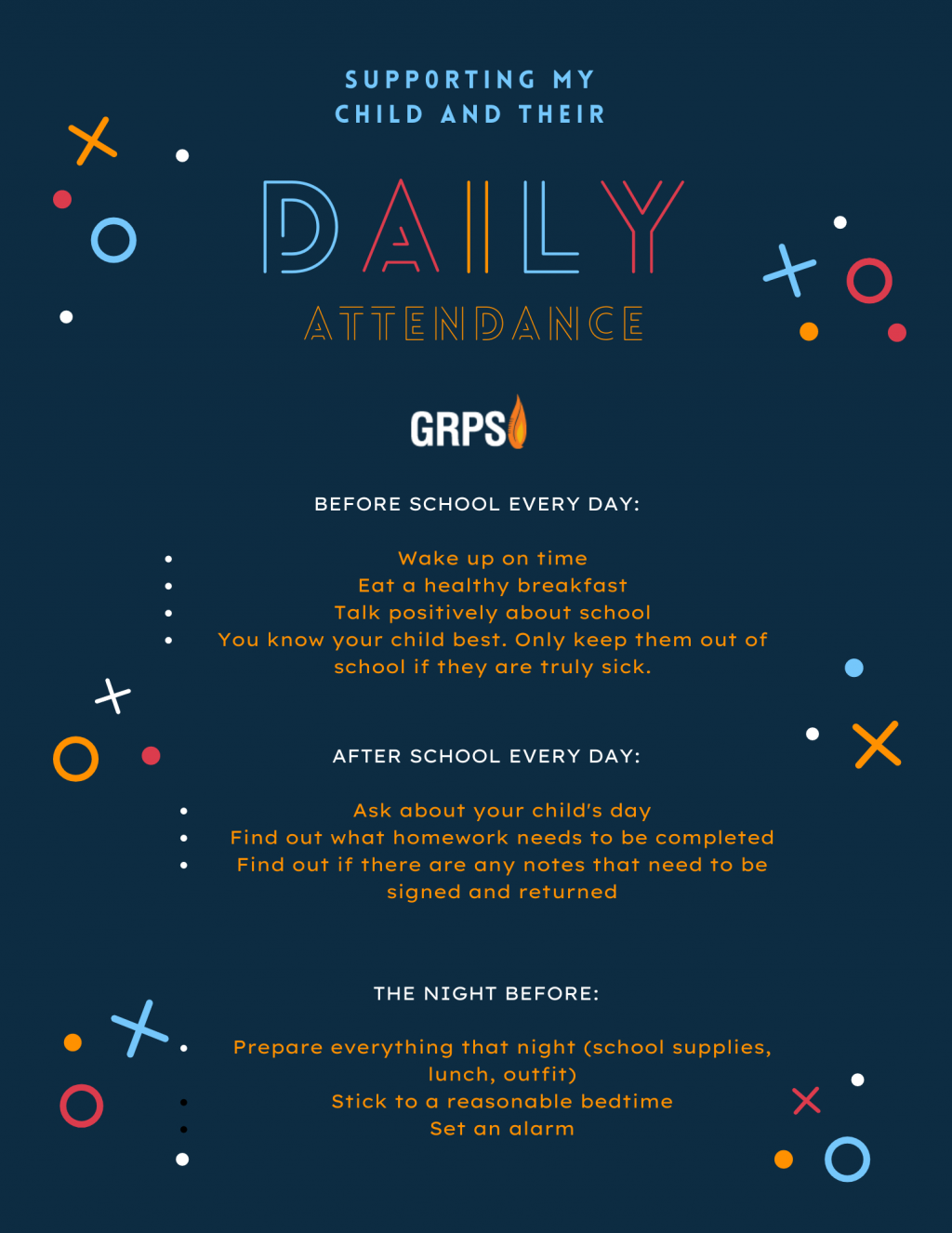
Strive for Less than Five!
When your child misses just one day of school per month, even in kindergarten and lower grades, they will be LESS likely to graduate from high school. But when your child misses fewer than five days of school per year — from kindergarten to senior year — high school graduation is much more likely.
Did you know that September is Attendance Awareness Month? GRPS’ FACE office aims to build and support a culture of attendance for all our students, which is why September’s Power Parent Magazine is dedicated to bringing our families the latest information about attendance.

Power Parent: September 2023 covers each of the following articles:
- How much do you know about the importance of good attendance? Put your understanding to the test in The Importance of Attendance
- How’d you do? Find the answers to the attendance pop quiz under Check your Answers!
- Under News Travels Fast, you’ll find links to news articles spotlighting GRPS’ innovative Strive for Less than 5! attendance campaign
- Knowledge is power! Learn about the barriers that contribute to poor attendance, and the ways we can work together to overcome those barriers, in Eliminating Barriers Together
- In Family Guides, you’ll find a collection of helpful handouts designed by Attendance Works to help families like yours build the habit of attendance
- Learn why some specialists think sleep is link “food for your brain” in Forming Healthy Sleep Habits
The Importance of Attendance
DID YOU KNOW? Missing one day of school per month, even in the younger grades, lowers your child’s likelihood of graduating from high school.
A student who misses 10% of the school year (around 18 days) is considered “chronically absent.” Chronically absent students may earn lower test scores and display poor attendance and retention in later grades. Parents and caregivers play an important role in making attendance a priority.

Attendance is a shared responsibility between a student, the parent or caregiver, and the school community.

Parent and caregivers play an important role in making school attendance a priority!
Every missed day of school is a missed opportunity to learn. Frequent absences, even in elementary school, can make your child fall behind in reading and math. Students with frequent absences are less likely to graduate high school.
Forming healthy sleep habits
Your child’s learning ability, mood, and behavior are linked to how much sleep they get each night. Parents know that a restful night can make the difference between a quick, pleasant morning routine and a tantrum, which can impact your child’s school attendance.
According to healthychildren.org and the American Academy of Sleep Medicine (AASM), children require different amounts of sleep each night depending on their developmental stage. Here is a helpful chart that your family can reference when establishing your child’s bedtime routine:

In addition to establishing healthy sleep habits, there are a number of other ways you can support your child. The FACE office created this helpful checklist of things your family can do before school, after school, and before bedtime each day to achieve your attendance goals:

GRPS Leads Nation with Campaign
GRPS’ innovative Strive for Less than 5! attendance campaign has been featured in a U.S. Department of Education webinar, NPR’s All Things Considered, and the website of national education consultant Attendance Works.
GRPS’ Strive for Less than 5! campaign recognizes that, as parents, YOU are the person your child will look to to promote good attendance. Like parents and caretakers before you, you have the day-to-day responsibility to make sure your children get to school, on time, every day.
Before families and schools can form a partnership to Strive for Less than 5!, it helps to understand the things that lead to poor attendance. Here are some situations that might cause your student anxiety and make them want to avoid school:
- Academic or social struggles
- Bullying
- Too much or not enough discipline, or an unsafe school environment
- Parents had a negative school experience

Just as your student might face anxiety around attending school, their attendance might also suffer because of disengagement. Here’s why:
- Classroom lessons are not engaging to the student, or don’t seem relevant to their lives
- Student hasn’t formed meaningful relationships with adults in their school
- Student enjoys being with peers outside of school more than they enjoy being with them in school
Eliminating Barriers Together
Did you know that some chronically absent students have poor attendance for reasons beyond their control, such as unstable housing, unreliable transportation and a lack of access to health care? GRPS’ Family and Community Engagement (FACE) office aims to build a culture of attendance, which begins with identifying these types of barriers and facing them head-on.

A portion of the Parent University website has been dedicated to listing useful local resources for families. GRPS is committed to supporting more than just a child’s education; follow this link to explore resources related to mental health, and nutrition services, bullying prevention, and more.
Under the Resources tab on the Parent University website, you can also find a link to the GRPS Student Handbook, which contains information about attendance, grading scales, behavioral expectations, and more.
Family Guides

Check out these amazing family guides from Attendance Works!
- Attendance Success in Elementary School (English)
- Attendance Success in Elementary School (Spanish)
- Attendance Success in Middle/High School (English)
- Attendance Success in Middle/High School (Spanish)
If you are looking for additional information about Attendance, please refer to Attendance Works Handouts for Families.
